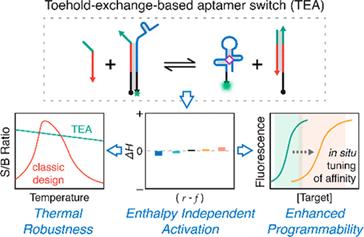Molecular switches that undergo conformational changes upon target binding are naturally evolved machinery to regulate diverse biological functions. Inspired by nature, chemists and synthetic biologists have developed intense research interests to create artificial chemically activated switches that can be used to mimic processes in living systems and further expand their functionality for uses in biosensing, imaging, therapeutics, and beyond. In this regard, aptamers are ideal functional molecules to develop artificial molecular switches because they not only are synthetic binders with high affinity and selectivity but can also be readily engineered via Watson−Crick base pairing. Indeed, aptamer switches are attractive nature-inspired tools for developing smart materials and nanodevices. However, the thermal robustness and programmability of current aptamer switches are often limited by their activation processes that are coupled with high reaction enthalpy.

To address this issue, Professor Feng Li and his group in the College of Chemistry, Sichuan University, reported an activation strategy with near-zero enthalpy gain, toehold-exchange aptamer (TEA), for aptamer switches. Thermal robustness and day-to-day reproducibility were successfully verified. In theoretical research, they found that during the activation process of traditional duplexed aptamer and hairpin-based aptamer, the high reaction enthalpy penalty is the main factor affecting sensing performance. Thus, they chose the reversible toehold-exchange with low enthalpy gain as a toolbox to overcome such challenge in temperature-dependence. Besides, they took advantage of the difference in effective affinity of several TEA designs to achieve in situ regulation of dynamic range in solution, verifying the excellent programmability of TEA strategy. TEA was also integrated with entropy-driven catalytic DNA circuit to confirm the composability of this strategy with existing dynamic DNA reaction networks. Crucially, such strategy in designing molecular switches is universal and does not rely on specific secondary or tertiary structures of aptamers. Their study not only enriches the current toolbox for engineering and controlling synthetic molecular switches but also offers new insights into their thermodynamic basis, which is critical for diverse synthetic biological designs and applications.
This work is published in Journal of the American Chemical Society entitled “Toehold-Exchange-Based Activation of Aptamer Switches Enables High Thermal Robustness and Programmability”. Sichuan University is the top institute in the address list. Prof. Feng Li is the corresponding author, Dr. Guan Alex Wang and Xinghong Wu contribute equally to this work as co-first authors. This work is financially supported by the National Natural Science Foundation of China, and the Institutional Research Fund from Sichuan University.
Link: https://pubs.acs.org/doi/10.1021/jacs.2c10928
